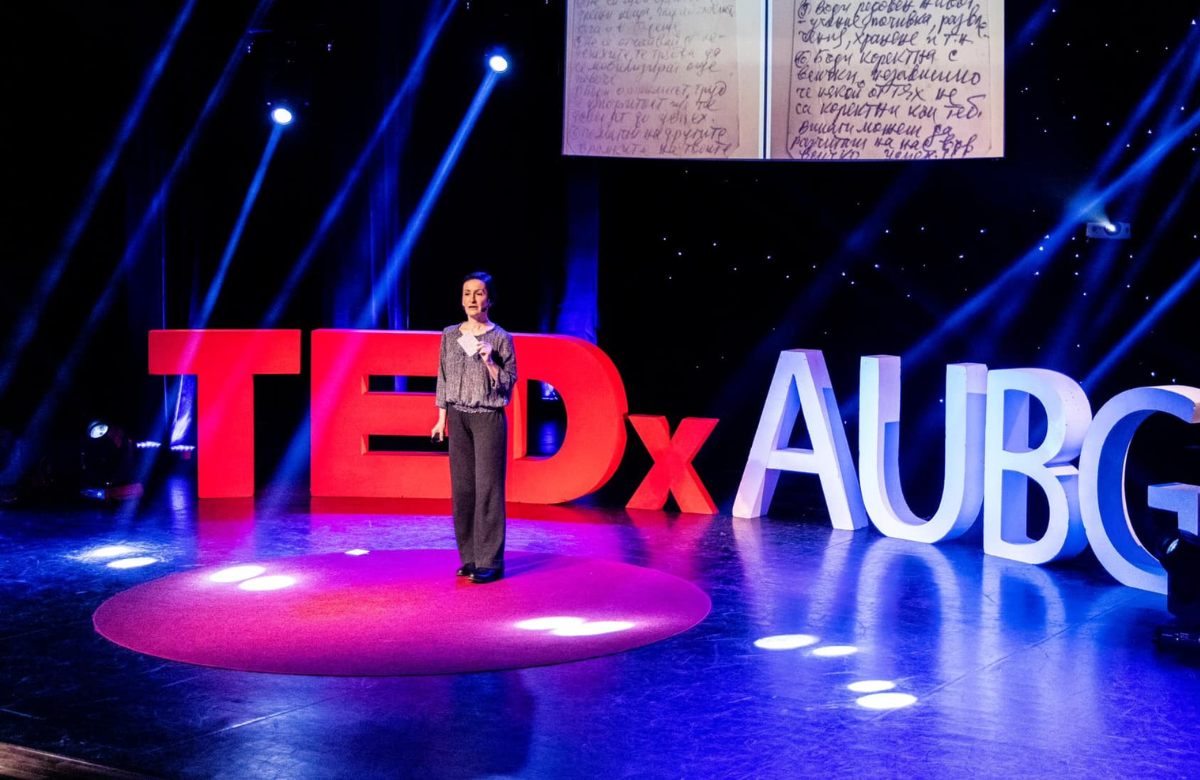Aside from teaching, Professor Elena Radeva dedicates much of her time to social causes and urban initiatives. She is a strong advocate of clubs at AUBG because of how they prepare students for real life. Professor Radeva is grateful for being where she is.
Listen to the interview with Professor Elena Radeva who teaches Conflict Management at AUBG to learn more about teamwork and leadership. You can read some of the highlights below.
If you are walking down the halls of the Main Building and you are wondering where the music is coming from, then wonder no more. Because the culprit is right here. Professor Elena Radeva. And music is just one of her ways to break the ice before the class starts.
Teamwork
Professor Radeva teaches Conflict Management and Organizational Theory and Behavior at AUBG. One of her many valuable pieces of advice for Business students and not only is how to work in a team.
“For me, the best team players are people who are respectful, so you are able to have an open conversation and disagree in a respectful way. You are comfortable disagreeing with your teammates… people who are willing to pitch in equally and not just sit back… people who are willing to learn new things.”
Leadership
Every team needs a leader and according to Radeva, a good team leader needs to have certain qualities.
“Transparency. For me, that’s the thing. Be honest. Have a good conversation with people, an honest conversation. Be fair. That’s a very important thing — not to have a different approach to different people because some of them are closer to you and some are not. A leader should never show such type of treatment to people.”
She also adds that a good leader owns up to their mistakes but also gives credit when it is due.
Conflict Management
However, we still haven’t reached a utopia where all of this is possible. Conflict exists. As a former team leader herself, Radeva has several suggestions on how to solve conflicts.
“Keeping your composure, be respectful. I always suggest that people need to put themselves in the shoes of others. Because very often we have certain assumptions, but we don’t know [what is actually happening]. Try to dig a little bit to understand why certain things are happening before actually being upset. Better communication helps solve a lot of problems.”
Importance of Student Clubs
She also thinks that AUBG is a great practice field for all of this because of the many club activities that require teamwork and leadership.
Radeva saw it herself when she participated in a TED talk organized independently by the university club TEDxAUBG.
“These are students and the level of execution [was professional]. Everything was running so smoothly.”
She believes that clubs are among the most valuable learning experiences at AUBG.
“I very much appreciate all the work [students] put outside of the classroom and this is what matters. Classes are just classes. Those clubs that you are part of — this is the really valuable experience, this is networking, this is project management, this is communication… It’s everything. So go after it.”
Time Management
Radeva is doing her own type of extracurricular activities by volunteering for various NGOs, consulting family businesses, and working for a better urban environment with Sofia municipality. All of this, she does aside from teaching, and she manages through a time management strategy.
“Have an online calendar. Don’t put deadlines on your calendar but go backward and put how many hours you are going to work on this or that assignment. Of course, many things come unexpectedly and that’s why you have to have a little buffer zone so you can add additional things, reorganize, reschedule. Planning is key to feeling comfortable: you know what you have to do, you know when you are going to do it … .”
Being Grateful
According to Radeva, all these things would have been impossible if she wasn’t privileged. That’s why she is grateful.
“I grew up in a family of educated parents, parents that were able to provide me with a lot of opportunities. I never had to wonder whether I would have dinner at home, would I have clothes to wear, would I be able to pay tuition. I was privileged. If you don’t recognize you are a privileged person, you don’t have the opportunity to recognize you have to give back. If we think about how privileged we are, I think it’s worth it to think about what we can do so others can have the same opportunities that we did, even though we didn’t deserve more than them.”





